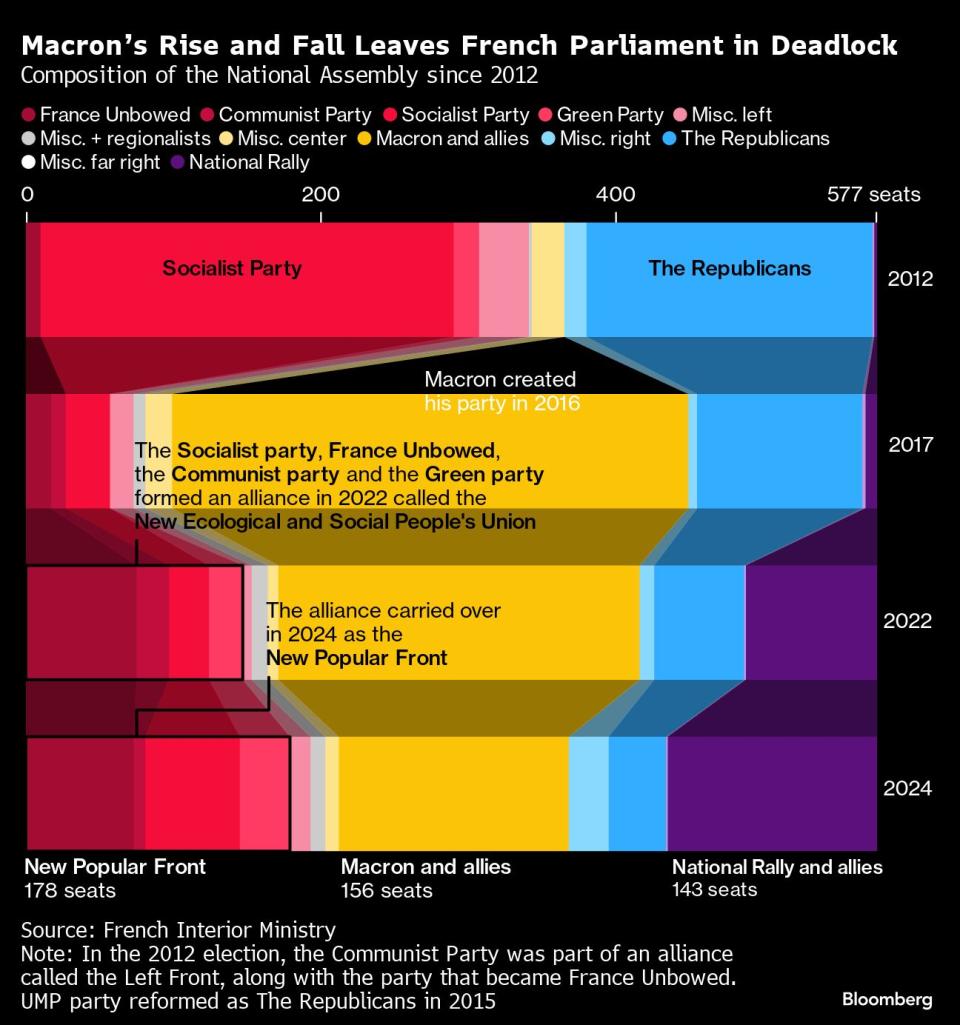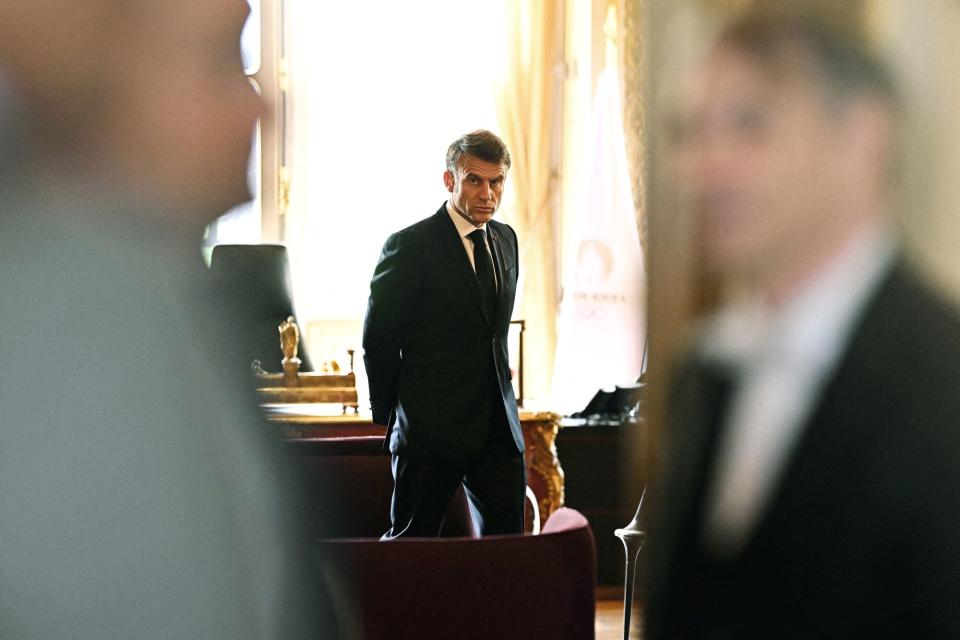Macron’s Vision of a Centrist Alliance Is Already Faltering
(Bloomberg) -- Emmanuel Macron’s efforts to defuse the political crisis he created with a snap parliamentary election have elicited brusque pushback, underscoring the French president’s waning authority and highlighting deep divisions.
Most Read from Bloomberg
Biden Vows to Stay in 2024 Race Even as NATO Gaffes Risk His Campaign
JPMorgan Notches Record Profit on Visa Gain, Dealmaking Jump
Tesla Delays Robotaxi Event in Blow to Musk’s Autonomy Drive
FCC Says It’s Investigating Massive Breach of AT&T Customer Data
Parties across the political spectrum rejected Macron’s appeal for “republican forces” to rally together to form a governing coalition. The left-wing alliance, known as the New Popular Front, insisted it had the mandate to nominate a prime minister, while the center-right Republicans vowed to bring down a left-led government.
The positions show that there’s no clear way through the impasse that emerged after the shock results of Sunday’s parliamentary elections. The French National Assembly was left split among three main factions after voters thwarted the far-right National Rally’s bid to take power.
After days of silence, Macron finally weighed in with his first substantive statement on the deadlock. In a letter published in France’s regional press on Wednesday, he acknowledged that the vote had demonstrated “a clear demand for change and for power-sharing,” urging lawmakers “to build a broad-based partnership.”
“I call on all political forces that recognize themselves in republican institutions, the rule of law, parliamentarianism, a European orientation and the defense of French independence, to engage in sincere and loyal dialog to build a solid majority, necessarily diverse, for the country,” he said.
The hung parliament has left Macron with his power hemmed in. While it appeared that he might look either to the center-left or to the center-right to construct a workable alliance, he instead appears to be trying to court both at the same time. It’s a gambit he tried in 2022, and it didn’t work for him then.
His definition of appropriate parties in effect excludes the far-left France Unbowed. Mathilde Panot, who leads the party in the National Assembly, said Macron’s letter was “shocking.”
She called on Macron to accept that the left had won the vote and said the NFP is working on a single candidate to put forward for the post of prime minister and that Macron must nominate this person.
“We have a democratic result,” she said Thursday on Franceinfo radio. “It’s not possible to change the rules when the result doesn’t suit you.”
Olivier Faure, head of the Socialist party, sounded a similar note, accusing Macron of failing to “respect the vote of the French people.”
While the left alliance stuck together, Bruno Retailleau — the leader of the Republicans in the Senate — rejected the idea of a left-led government. He urged Macron to pick a neutral premier from outside the National Assembly, warning that if a candidate is chosen from the left-wing alliance, his party would launch a motion of no-confidence to try to bring down the government.
In a late evening tweet, the leader of the far-right National Rally, Marine Le Pen, said her party would not back any government that has a member of France Unbowed or the Greens in a ministerial post. Beyond that condition, the National Rally wouldn’t reject a left-leaning government out of hand, Renaud Labaye, the party’s general secretary in the National Assembly, told French daily Le Figaro Thursday.
Under the French constitution, Macron has the prerogative to appoint the prime minister, but threats to topple the government make the choice delicate. In his letter, the president said he’d wait to name a prime minister in order to give the discussions a chance to bear fruit.
As jockeying intensifies, concerns about the country’s path triggered a warning by Bank of France Governor François Villeroy de Galhau. He said the country can’t afford to keep increasing the deficit or burden companies with more taxes and costs, highlighting the uncertainty created for the economy by the political drama.
“As we exit the inflation shock, unfortunately there’s another shock threatening – an uncertainty shock,” he told Franceinfo radio on Thursday. “Business leaders are telling us they are worried about the wait-and-see approach of their customers who are choosing to save instead of spend, about delay of investment, and about freezing hiring.”
After Sunday’s second round of voting, the New Popular Front — which includes France Unbowed, the Socialists, the Greens and the Communists — has the most lawmakers in the lower house of parliament after an unexpected surge. But it’s still around 100 seats short of an outright majority in the 577-seat lower house. The unprecedented outcome means deal-making to try to form a lasting government.
Macron said in his letter that the current government will continue to operate in the interim, and work is continuing. Finance Minister Bruno Le Maire sent 2024 spending limits to ministries on Thursday and said he has instigated technical work for the 2025 budget, although it will be up to the next government to decide on that.
“Either we continue with savings and repairing public finances, or we massively increase taxes on French people,” Le Maire said. “It’s the only alternative, failing which we would expose ourselves to a very strong market reaction.”
--With assistance from Alexandre Rajbhandari.
(Updates with Le Pen tweet and National Rally position in 12th paragraphs.)
Most Read from Bloomberg Businessweek
Ukraine Is Fighting Russia With Toy Drones and Duct-Taped Bombs
He’s Starting an Olympics Rival Where the Athletes Are on Steroids
©2024 Bloomberg L.P.

 Yahoo News
Yahoo News 



